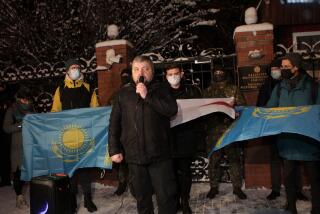West’s Blindness Invites a Monster : Russia: Needs are so desperate, the repressive past is looking good.
- Share via
When, only hours after leaving Washington, Boris Yeltsin complained at a news conference in Ottawa that American business leaders and “some governments” weren’t putting their money where their mouths were when it came to aiding reform in Russia, not a few of his friends in Washington and New York were upset. After all, they grumbled, the Russian president had been wined and dined in the very top government and corporate circles and given the best advice. Meanwhile, tons of food aid was on its way. What more did he expect? Here we are in a recession when so many Americans are hurting. What’s more, they said, it’s an election year; what candidate wants to be accused of caring about Russia more than America? Instead of trying to frighten us with the specter of a Communist coup, Yeltsin should be grateful for what he gets. And if he can’t get his act together, that is his problem.
Perhaps the righteously indignant should consider the following:
On June 5, 1947, on the occasion of a commencement speech at Harvard, Gen. George Marshall ade the following statement: “Our policy is directed not against any country or doctrine but against hunger, poverty, desperation and chaos. Its purpose should be the revival of a working economy in the world to permit the emergence of political and social conditions in which free institutions can exist.”
What the secretary of state was presenting was the Truman Administration’s European Recovery Plan, which soon became known as the Marshall Plan. After prolonged and often bitter debates in the House and the Senate, the ERP bill was passed on April 3, 1948. Between then and 1951, Congress authorized $13.35 billion for the ERP, about 70% of which went to two World War II allies, Britain and France, and two enemies, Germany and Italy.
Put in the most simple terms, the Marshall Plan was devised as a way to make sure that fascism would not reappear and that Soviet totalitarianism would not spread. By having had the vision and the will to spend the equivalent of more than $130 billion in present-day dollars over a period of four years, the United States government and the American people made a major contribution to world security as well as to their own. Had the Soviet system of government spread in those postwar years, had fascism once more arisen, the consequences would have been dire for all--America included.
Today, it is the Russians who are suffering from hunger, from poverty, from desperation and from chaos. Because of that, even the oppressive and repressive Soviet system of the past is beginning to look attractive again to many of them. Along with the fall of that system, which most Russians believed in, ideals have died and pride has suffered a terrible blow; shattered illusions, lost sense of purpose and direction, barren shelves and skyrocketing prices, an insecure present and an even less assured future--that is a charitable description of Russian reality. And that is the fetid swamp in which breeds the virus of Russian fascism.
Yeltsin is not trying to frighten anyone with his warnings; he is telling it like it is. Should the reforms fail--as they most assuredly will if there is no serious Western support--the Russian people, like the Germans in 1933, will democratically elect to high office a monster or, as they themselves did in November, 1917, will support a takeover by people whose aspirations are anything but peaceful.
In either case, this new and dictatorial Russia will immediately reoccupy all of the newly independent states and will do so with impunity. After all, America would not risk a nuclear war over Lithuania, or even Ukraine, would it? Ruling with a fist of iron, the new Russian Establishment, unhampered by such annoyances as elections and opposition parties, will certainly be able to restore order and make the economy function as well as in the past. But even if their success is short-lived and they are made to face the prospect of losing power, these new rulers will not hesitate to take the world with them, should they go down.
Boris Yeltsin is upset at the West’s blindness. He cannot believe that campaign politics preclude the possibility of telling Americans the truth: that it is in their most vital interests that democratic reform wins out in Russia, that insofar as they are concerned, the issue is not aid to Russians but guaranteeing a war-free future for Americans, and that such a cause is worth as many billion of well-directed and well-controlled dollars as may be needed.
The Marshall Plan testifies to that.
More to Read
Sign up for Essential California
The most important California stories and recommendations in your inbox every morning.
You may occasionally receive promotional content from the Los Angeles Times.










